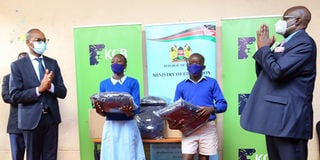KCB introduces facility to help schools meet Covid-19 protocols ahead of reopening
Sponsored by KCB Group

KCB Group CEO and MD Joshua Oigara (left), with Education Cabinet Secretary, Prof George Magoha, during the handover of a million face masks to Olympic Primary School in Kibera, Nairobi. Receiving the masks are Class Eight pupils Rachiel Odiwa (second right) and Flavian Mbone.
By Kevin Rotich
KCB Bank Kenya has introduced a new service to help schools prepare for reopening in line with provisions to limit the spread of Covid-19.
The Learning Institutions Proposition consists of several loan solutions, including an infrastructure facility to cater for structural expansion, and others for enabling use of technology and provision of adequate personal protective gear and hygiene, sanitisation and fumigation items.
KCB Retail Director Annastacia Kimtai says all learning institutions qualify for the loan, and that the range of loans is dependent on the size of the school, their requirements and ability to pay back.
“We have been offering schools access to loans for procuring virtual learning equipment, including tablets for learners, laptops for teachers, and learning material. Schools are also projected to require computers, projectors and the accompanying software to enhance virtual access for learners. We shall continue to support schools as they plan on reopening,” says Ms Kimtai.
She adds: “We also recognise that for a school to reopen, the Ministry of Education Covid-19 guidelines recommend that it should have an isolation centre for suspected Covid-19 cases, and adopt social distancing measures, among others. The solutions offered by the bank are sensitive to this and will include the modification of physical spaces for social distancing, and enhanced sanitation in the form of water tanks, sanitisation booths, toilets, and sinks, and masks and gloves.”
Ms Kimtai says KCB Bank will continue providing unsecured loans and overdrafts for salaries and short-term expenses for the schools. “As a bank, we are cognizant of the fact that schools have not been receiving income in the last eight months,” she points out.
Learning institutions are facing reduced cash flows as they remain only partially open countrywide, accommodating only students in Grade Four, Class Eight and Form Four. The rest are expected back in January 2021, according to a calendar released by the Ministry of Education recently.
In March, the Government ordered all learning institutions closed amid rising cases of Covid-19. Partial reopening of studies was only allowed in October.
Unlike public institutions that are assured of Government’s funding, private institutions rely solely on fees collected from students and pupils to stay afloat.
To cushion them, KCB restructured over Ksh1 billion loans and overdrafts for schools between April and September. The Bank also offered schools repayment holiday packages.


